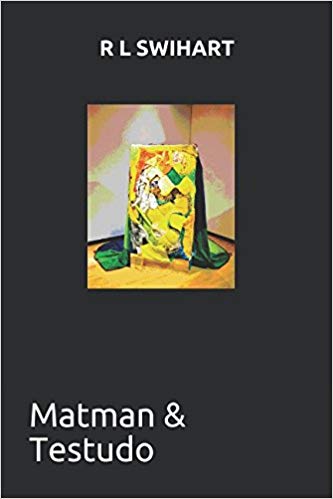https://www.albany.edu/offcourse
http://offcourse.org
ISSN 1556-4975

Published by Ricardo and Isabel Nirenberg since 1998
Matman and Testudo, by R. L. Swihart, reviewed by R Nirenberg
R L Swihart, Matman & Testudo, Gold Across the Water Books, 2018. (Available at Amazon both as a paperback and in Kindle format).

These poems are not easy fare, but they repay the reader's effort. Swihart relies on vivid images to catch and save the accidental, and then memory and thoughtfulness are on the ready to transform it into something that simply had to be. As in this piece mysteriously titled, "The Two Minds of Vladimir Saldi":
"There's the voice of reason: All poets slip into the ridiculous
re the underpinnings of poetry (cf. Coetzee on Brodsky)
Which doesn't negate the call: In this instance the mantic,
Mosaic fire the sun sends across the water
The girl with the gecko tattoo stops jogging in order to
stretch on the canal's white railing"
I don't know if all poets slip into the ridiculous when they try to explain the nature and function of their art, but many who try do slip, and Swihart gives the example of Joseph Brodsky, who pretended that he, the poet, was but a vehicle, a voice—a sacer vates—of the whole history of poetry. For which Coetzee took him to task on the pages of the NYRB, about twenty years ago. Nevertheless, knowing the risk, Swihart hazards to identify what moves him to the poem ("in this instance"), and it turns out that it is "the mantic, Mosaic fire the sun sends across the water." That's quite a line (well, a bit more than a line). Mantic like in praying mantis, mántis a Greek word that appears early in the Homeric Iliad, when Agamemnon calls the seer Kalkhas mántis kakôn, seer of evils. Indeed, what can be more mantic, more akin to a seer, than the sun and its fires? "Mosaic" means, I think, law-giving. Why can't it be something formed out of small pieces of marble or suchlike? Because of the capital M, since, as you can see, Swihart does not capitalize the first letter in a line that is not at the beginning of a stanza. So Mosaic, as in Moses. The whole line, "the mantic, Mosaic fire the sun sends across the water," calls to mind Paul Valéry's "Cimetière marin":
« L'âme exposée aux torches du solstice,
Je te soutiens, admirable justice
De la lumière aux armes sans pitié ! »
And it reminds us, too, of the odd name of Swihart's publisher (perhaps himself?) on the title page: Gold Across the Water Books. Everything converges, and accidentally, yet necessarily just by being here, it converges to the girl with the gecko tattoo.
Towards the end of our book, under the title "Chateaubriand Tries to Squeeze It into a Few Lines," another, similarly textured, similarly admirable beginning of a poem about seers:
"Of course we are all seers. And blind to ourselves.
Where was I – when I looked back? The peaks and valleys were
flattened and all I could see was a straight line"
We are blind to ourselves, except perhaps when we turn around and look back, and then what we see is terrifying because it is all absence, as in Eugenio Montale's best-known poem, "Il nulla":
"il nulla alle mie spalle, il vuoto dietro
di me..."
Nothingness at my back, emptiness behind me... In a piece of prose, longer than the others, titled "Something About Sam," Swihart composes the final years of Sam, a retiree from Ahlstrom Glass. Sam "just needed to keep busy," and so "became the official unofficial greeter at Mr. Burger." Until Sam retired from that too, and mostly kept to bed, while his daughter Teri started collecting small wooden angels that she placed "on a knick-knack shelf above Sam's bed." Right after which comes the denouement, two days before Sam died:
"Sam acted mildly interested in the topic, but insisted he knew more about angels than Teri. Said, so far as he knew, angels, no matter which way they turned, were always facing God"
That is knowing about angels alright, and about how we differ from angels, and that's why we are always and from the four corners being told: Look forward, ahead of you, to a brighter future, etc. Above all, don't live in the past. "Non, je ne regrette rien", as Edith Piaf used to sing, rolling her r's as no one else ever could.
Swihart's book will richly repay your efforts. It's there, at Amazon.
R.L. Swihart's first book was reviewed in Offcourse #50, https://www.albany.edu/offcourse/issue50/three_reviews_nirenberg.html. His poems have appeared many times in this journal.
R. Nirenberg is editor of Offcourse.